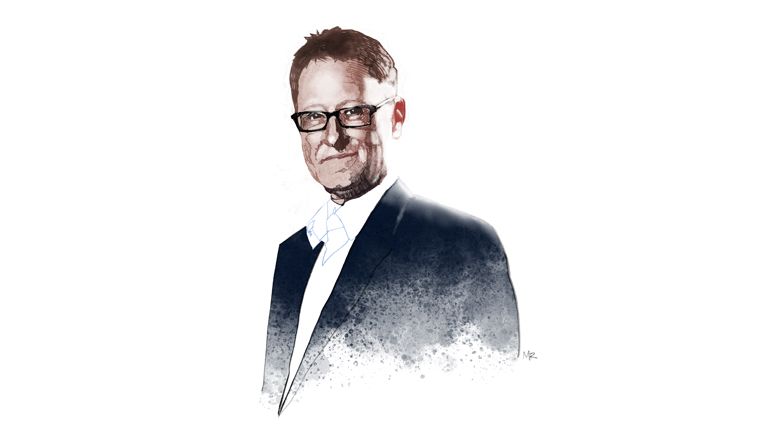What is the first news event you can recall?
I remember the power-cuts of 1973, due to the “three-day week”. I was six years old and we had bathtime and bedtime stories by candlelight. My sisters and I found it all very exciting.
What is your favourite quote?
“People don’t believe in ideas; they believe in people who believe in ideas.” I heard it from an old teacher, the late Ze’ev Mankowicz.
Which of your ancestors or relatives are you most proud of?
I like bragging about my great-uncle, Mick Mindel, who in the 1930s served as the leader of the United Ladies Tailors’ Trade Union—formed entirely of the sweatshop workers of London’s East End, with a rulebook half in English, half in Yiddish—and who played a role in the confrontation with Oswald Mosley’s fascists in the Battle of Cable Street of 1936. But the person I am proudest of is my mother, Sara, who survived a traumatic childhood—including the loss of her own mother to what was the last V2 rocket of the Blitz—to become a loving, gentle and wise woman.
What is the last piece of music, play, novel or film that brought you to tears?
Every Christmas my family sits down to watch It’s a Wonderful Life—and I get my crying in early. I am moved to tears every time by one of the first scenes in the film. It’s the “Mr Gower” incident in the drugstore. If you know the film, you’ll know.
Your new book, The Traitors Circle, tells the remarkable story of a group of distinguished Germans who plotted against Hitler during the war. Why, beyond the Von Stauffenberg Plot, are these narratives relatively unknown?
One Allied investigator estimated that over the course of the Third Reich some three million Germans were detained for crimes of dissent, sometimes for no more than a critical remark. And yet, as you say, those stories are hardly known. The story I tell in The Traitors Circle is, to my mind, astonishing, and yet there has never been a book devoted to it, not even in German. I suspect it’s because the Second World War operates in the culture as a morality tale, a Manichean contest of good versus evil—and that binary is simplest and clearest if all the Germans are evil and everyone else is good. But neither half of that proposition is right.
You have clearly thought deeply about what it means to be a “traitor”—when it is right, or wrong, to act against a country or government. Where do the boundaries lie?
The people in this book were branded traitors and yet they were the very opposite. I don’t merely mean that they did not betray their country; I mean that they were acting out of love for their country. They were deeply patriotic and desperate to see Germany return to what they believed were the German values that Hitler and the Nazis had betrayed. Their motives were not self-serving: they had nothing to gain from their actions and everything to lose. Their example offers a useful answer to your question: when a government is engaged in murderously immoral acts, and every democratic mechanism has been shut off, then trying to stop them is anything but treachery.
You are a thriller writer (under the pseudonym Sam Bourne) in what little spare time you must have. Do you find that writing genre fiction has made you a better historian? And vice versa?
There’s no doubt that writing the Sam Bourne thrillers prepared me for writing, first, The Escape Artist and, now, The Traitors Circle. They taught me to hold back information, to build suspense—and that seems a perfect way to tell a genuinely thrilling story from history. So long, that is, as nothing is made up and the facts are rigorously sourced. As for “vice versa”, I don’t yet know the answer to that—Sam Bourne has been resting since I started writing history. Though he may stir awake at some point.
What would people be surprised to know about you?
That I was once an extra in Grange Hill.
Jonathan Freedland’s latest book, “The Traitors Circle: The Rebels Against the Nazis and the Spy Who Betrayed Them”, is out now from John Murray












